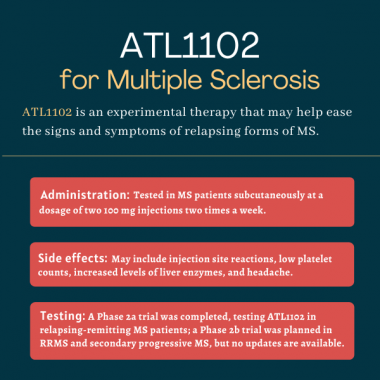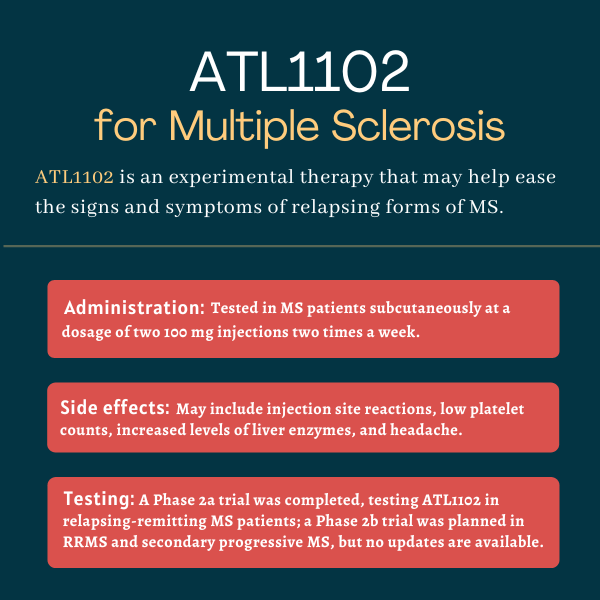This is a recent MS article, i tried to copy link but failed so here is the article without interactive aspects.
Explains our product pretty clearly in lay terms for those that might be interested.
ATL1102 for Multiple Sclerosis
Last updated June 13, 2022, by Teresa Carvalho, PhD
Fact-checked by Ines Martins, PhD
On This Page: How ATL1102 works | Administration | Clinical trials | Side effects | FAQs
What is ATL1102 for MS?
ATL1102 is an injectable therapeutic candidate that may help ease the signs and symptoms of relapsing forms of multiple sclerosis (MS). It was developed by Antisense Therapeutics, which now primarily intends to investigate the therapy for Duchenne muscular dystrophy, a disease that causes progressive muscle weakness and wasting.
The company announced in 2020 it was looking for partners to continue developing the therapy in MS after positive early trial data.
Previous trial results had shown that ATL1102 was effective in reducing the number of new brain lesions in patients with relapsing-remitting MS (RRMS).
Therapy Snapshot
Column 1 Column 2 0 Treatment Name: ATL1102 1 Administration: Tested in MS in subcutaneous injection formulation 2 Clinical Testing: Previously tested in a Phase 2a trial in RRMS; current trial status unknown
mce-anchorHow does ATL1102 work in MS?
MS is an autoimmune disease wherein the immune system wrongly recognizes as foreign the protective myelin sheath around nerve fibers. As such, the immune system mounts a response against this coating, leading to inflammation, loss of myelin (demyelination), and nerve cell death.
ATL1102 is designed to prevent immune cells in circulation from getting into the brain and spinal cord and causing damage. A second-generation antisense inhibitor, it works by reducing the amount of CD49d messenger RNA, which serves as an intermediary molecule for the production of the CD49d protein.
This protein is a subunit of an adhesion molecule — called VLA-4 or alpha-4-beta-1-integrin — that helps immune cells cross blood vessels. By lowering CD49d, ATL1102 also reduces the amount of VLA-4 proteins that help immune cells enter the central nervous system.
Of note, Tysabri (natalizumab) is a monoclonal antibody approved for relapsing forms of MS. It also works by blocking the VLA-4 protein, meaning this is a validated target for MS treatments.
mce-anchorHow will ATL1102 be administered in MS?
ATL1102 is given via a subcutaneous (under-the-skin) injection. In a Phase 2 clinical trial, the treatment was tested in MS patients at a dose of 200 mg, given as two 100 mg injections, twice weekly. Further testing would be needed in additional clinical trials to ascertain a final recommended dose for the therapy.
Other experimental therapies in clinical trials for multiple sclerosis
CNM-Au8
Evobrutinib
Fenebrutinib
GA Depot
Ibudilast
Lipoic acid
Masitinib
Minocycline
Nabiximols
Remibrutinib
Rituximab
Simvastatin
Temelimab
Tolebrutinib
Ublituximab
Vidofludimus calcium
mce-anchorATL1102 in MS clinical trials
Phase 2a trial
After it was deemed well-tolerated in healthy volunteers, ATL1102 was investigated in a Phase 2a trial (ACTRN12608000226303). That trial enrolled 77 patients with RRMS in Australia.
Participants were given 200 mg of ATL1102, or a placebo, administered via subcutaneous injections three times per week in the first week, then twice weekly for the next seven weeks. All patients were then followed for an additional eight weeks.
The trial met its primary objective, reducing the number of new brain lesions — with or without active inflammation — in participants. Data showed that the number of lesions, after eight weeks, was 54.4% lower in patients on active treatment than among those receiving a placebo.
The total number of lesions with active inflammation also was reduced by 66.7% after four weeks, and even further, by 88.5%, at week 12.
Disability progression and relapse rates were not significantly different over the 16 weeks. Researchers noted, however, that a longer follow-up time would be needed to observe differences in these outcomes.
Notably, the effects on brain lesions were similar to those observed with Tysabri treatment in previous clinical trials — but ATL1102 may be less likely to cause other infections, the researchers found. Specifically, the team said the data show that treatment with ATL1102 may be less likely to lead to progressive multifocal leukoencephalopathy (PML), a severe brain infection caused by the John Cunningham virus.
A later analysis also found that ATL1102 may have neuroprotective effects, as the treatment reduced the number of lesions that turned into black holes or regions of loss, indicating permanent neuronal damage.
Future trials
Following the promising Phase 2a data, Antisense submitted an application to the U.S. Food and Drug Administration (FDA) requesting clearance for a larger Phase 2b trial. That trial was designed to recruit 195 people with RRMS and secondary progressive MS (SPMS).
The regulatory agency placed a partial restriction on the trial in 2017, however, allowing ATL1102 infusions to be given only at a low dose, 25 mg per week, and only for up to six months. No further updates have since been given by the company about this study, and it is unclear when the trial will start dosing participants.
A smaller study of ATL1102 in active SPMS patients also was proposed to the National Multiple Sclerosis Society in 2017. The plan for that trial was to test ATL1102 in 16 patients at a weekly 200 mg dose for 24 weeks. The trial was expected to support an early access program that made ATL1102 available to patients without available therapies. However, there has been no additional information released about this proposed trial since 2017.
mce-anchorCommon side effects of ATL1102
The most common adverse events (side effects) associated with ATL1102 in multiple sclerosis clinical trials were:
- injection site reactions
- low platelet counts
- increased levels of liver enzymes
- headache
More Information: Click on the links below to learn more about multiple sclerosis.
Overview
Types
Causes
Symptoms
Diagnosis
Approved Treatments
Experimental Treatments
Check out our collection of Expert Voices, where we ask an expert your questions on a variety of topics.
Diet and Nutrition
Pain Management
Cannabis Use
Financial Planning
Managing Fatigue
Exercise
More
mce-anchorFAQs about ATL1102 in MS
A
How does ATL1102 help with multiple sclerosis?
ATL1102 is an antisense inhibitor of CD49d being investigated as a potential therapy for relapsing forms of multiple sclerosis (MS). By blocking CD49d production, ATL1102 prevents immune cells from reaching the brain and spinal cord, which is expected to reduce MS-driving inflammation. In clinical trials, ATL1102 rapidly reduced the number of new lesions in the brain and also prevented these lesions from progressing into regions of permanent damage.
a
When will the FDA approve ATL1102?
a
Can I take ATL1102 while pregnant?
a
How long should I wait to see the results of ATL1102?
a
Does ATL1102 cause hair loss or weight gain?
- Forums
- ASX - By Stock
- PER
- MS re-visit
MS re-visit
- There are more pages in this discussion • 21 more messages in this thread...
You’re viewing a single post only. To view the entire thread just sign in or Join Now (FREE)
Featured News
Add PER (ASX) to my watchlist
 (20min delay) (20min delay)
|
|||||
|
Last
8.0¢ |
Change
0.003(3.90%) |
Mkt cap ! $72.12M | |||
| Open | High | Low | Value | Volume |
| 7.9¢ | 8.3¢ | 7.9¢ | $147.1K | 1.826M |
Buyers (Bids)
| No. | Vol. | Price($) |
|---|---|---|
| 1 | 300000 | 7.9¢ |
Sellers (Offers)
| Price($) | Vol. | No. |
|---|---|---|
| 8.3¢ | 106165 | 2 |
View Market Depth
| No. | Vol. | Price($) |
|---|---|---|
| 1 | 300000 | 0.079 |
| 1 | 120000 | 0.078 |
| 1 | 100000 | 0.077 |
| 1 | 26315 | 0.076 |
| 1 | 10000 | 0.075 |
| Price($) | Vol. | No. |
|---|---|---|
| 0.083 | 106165 | 2 |
| 0.085 | 250000 | 2 |
| 0.086 | 6000 | 1 |
| 0.087 | 25001 | 1 |
| 0.088 | 100000 | 1 |
| Last trade - 16.10pm 08/05/2024 (20 minute delay) ? |

|
|||||
|
Last
8.0¢ |
Change
0.003 ( 3.90 %) |
||||
| Open | High | Low | Volume | ||
| 7.9¢ | 8.3¢ | 7.9¢ | 108394 | ||
| Last updated 15.59pm 08/05/2024 ? | |||||
Featured News
| PER (ASX) Chart |
The Watchlist
LU7
LITHIUM UNIVERSE LIMITED
Alex Hanly, CEO
Alex Hanly
CEO
SPONSORED BY The Market Online








